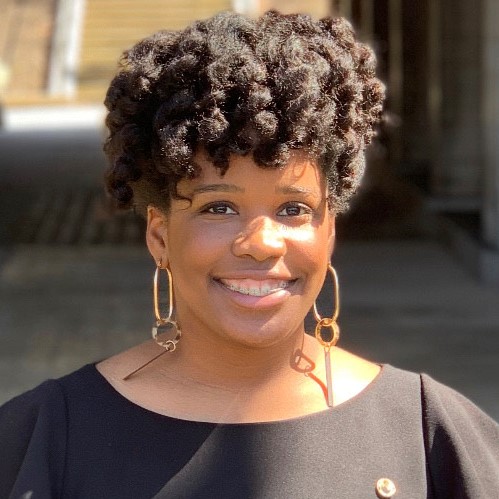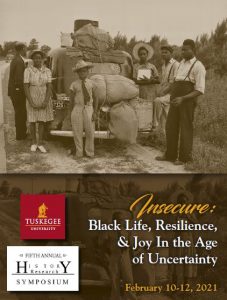
Dr. Monroe, Trinity Students to Present at Tuskegee U. History Symposium
“The Bigger Picture”: Historicizing the Music of Social Inequality”
Dr. Kimberly Monroe, assistant professor of global affairs, will be moderating a Trinity student panel on Friday, February 12, 2021, at the Historic Research Symposium hosted by Tuskegee University. “The Bigger Picture”: Historicizing the Music of Social Inequality” will feature Trinity students Sholachauntel Shoda, Myra Strickland and Payton D. Green. The theme for the three-day, virtual symposium is: “Insecure: Black Life, Resilience & Joy In the Age of Uncertainty.”
The panel featuring Trinity students is on Friday, February 12, 2:30 to 3:40 pm, Eastern time (note: Conference web site lists all sessions in Central time, and lists the Trinity session at 1:30-2:40 pm Central time.)
Registration for the entire February 10-12 symposium is free and open to the public. To register, go to: www.tuskegee.edu/historyresearchsymposium. Contact hrs@tuskegee.edu if you have any difficulties registering.
Insecure: Black Life, Resilience, & Joy In the Age of Uncertainty
Historic Research Symposium hosted by Tuskegee University, February 10-12, 2021
 The 2021 HRS includes synchronous and asynchronous virtual sessions. This year’s theme: “Insecure: Black Life, Resilience, & Joy in the Age of Uncertainty,” underscores the undeniable challenges brought to the forefront of American history in 2020 and 2021. Many of the rhythms of life that we have grown accustomed to, now look different, feel different, or in some cases, no longer exist. In just a sweep of months, we have contended with and engaged in rebellions against state violence, a global pandemic, faltering political institutions, and an economy that has shined a bright light on deep levels of inequality. Insecurity seems to be the operative word to describe this moment in time.
The 2021 HRS includes synchronous and asynchronous virtual sessions. This year’s theme: “Insecure: Black Life, Resilience, & Joy in the Age of Uncertainty,” underscores the undeniable challenges brought to the forefront of American history in 2020 and 2021. Many of the rhythms of life that we have grown accustomed to, now look different, feel different, or in some cases, no longer exist. In just a sweep of months, we have contended with and engaged in rebellions against state violence, a global pandemic, faltering political institutions, and an economy that has shined a bright light on deep levels of inequality. Insecurity seems to be the operative word to describe this moment in time.
The Symposium’s theme also reflects upon resilience and joy. It seeks to inspire attendees to reimagine the current state of insecurity as a pathway to racial progress, harmony, and stability. It challenges us to think critically about the role of historical inquiry. The beauty and burden of blackness are to have the ironic privilege of grappling with this complex history and using it to inform how we chart our future. There has been a wide range of responses to troubling times. They include making space for lamentation, self-preservation, resistance, and even joy. All are legitimate, connected, and often exist at the same time in the same person or community.
Registration for the entire February 10-12 symposium is free and open to the public. To view the conference website and register, go to: www.tuskegee.edu/historyresearchsymposium. Contact hrs@tuskegee.edu if you have any difficulties registering.
